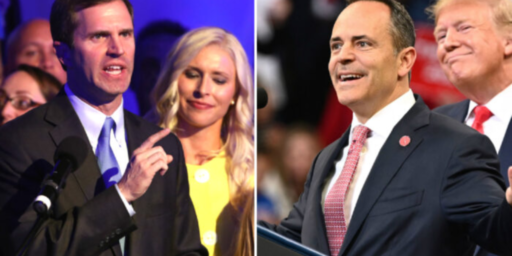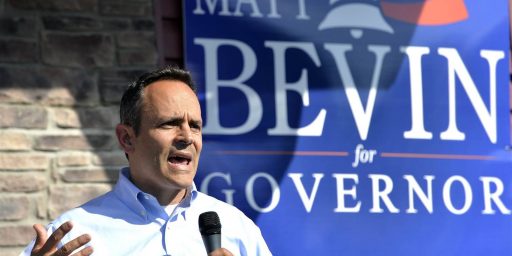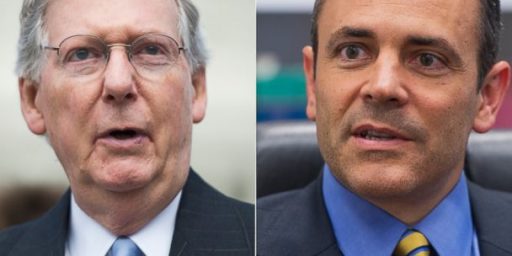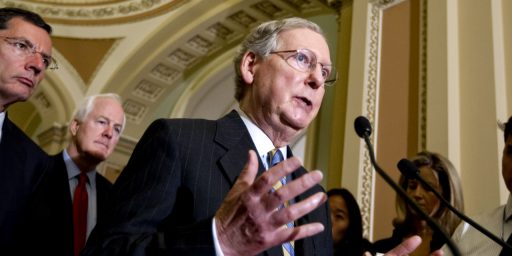The Tea Party’s Candidate Selection Problem
From the beginning, the Tea Party has shown itself to be just plain bad at picking candidates. This year, they finally seem to be on the verge of paying for it in the GOP primaries
The Wall Street Journal’s Kimberly Strassel hits the nail on the head in her diagnosis of why Tea Party candidates such as Matt Bevin seem to be bombing in Republican primaries:
The Senate Conservatives Fund, FreedomWorks, the Madison Project, the Club for Growth and some tea party groups roared into this primary season determined to claim more GOP scalps. The roar has faded to a whimper. In every race involving a Senate Republican incumbent, the outsider candidate is lagging—if not holding a 20-point deficit.
The challengers aren’t bombing because of a lack of money or the “establishment,” but mainly because of some mind-boggling embarrassments. Dr. Milton Wolf, challenging Pat Roberts in Kansas, was discovered to have a penchant for posting gruesome X-ray images of dead people on Facebook. (Whoops.) Kentucky’s Matt Bevin, challenging Mitch McConnell, has been forced to explain his changed positions on the 2008 government bank bailout, and more recently his presence at a cockfighting rally. (Uh-oh.)
Chris McDaniel, a lawyer and state legislator challenging Mississippi’s Thad Cochran, spent April dealing with past comments as a radio host, including derogatory references to Mexico and “Mamacita.” He’s also fielding awkward questions about his past plaintiffs’ work, including his request that a judge blow up Mississippi’s tort reform. (Ummm.)
These episodes have turned off the very people these outside groups claim to represent: the grass roots. Many Republican voters—even those desperate for a party shake-up—simply aren’t comfortable supporting a doctor who publicly mocks gunshot victims. They expect (and deserve) something more serious. That’s to their credit, and it’s tempting to therefore write off all this as proof the system works. Bad candidates lose. No harm done.
Only that ignores the harm done. Consider the waste, at a time when the conservative movement can ill afford to squander resources. There is no disgrace in backing a sound and serious candidate who can’t quite carry it over the finish line. That’s honest primary competition. By contrast, it is political malpractice to throw tens of thousands of donors’ dollars at a candidate whose Facebook posts or past radio shows no one bothered to check. It’s called V-E-T-T-I-N-G.
The best insurgent candidates are those who demonstrate an ability to raise money and attract voters (think Ron Johnson, Marco Rubio, Pat Toomey, Deb Fischer ) even before the endorsements of outside groups. One of the Club for Growth’s best Senate prospects this year is Arkansas’s Tom Cotton (challenging Sen. Mark Pryor ), who has spent two years in the House. By contrast, most of the current incumbent-challengers were “created” by outside groups. They’d ordinarily never have had a showing—and for good reason.
There’s also the damage to the movement. The press is churning out stories about how the tea party is fading fast. That’s terrifically unfair to the grass-roots, which hasn’t been given candidates worth rallying around. Primaries matter and conservatives have legitimate grievances with some incumbents. They’ve been cheated this time, because too many of the D.C. insiders running these groups have been more interested in settling grudges against Mr. McConnell than in doing their homework.
McDaniel, of course, is only one of the Tea Party candidates that are having problems. The efforts of several candidates backed by different Tea Party groups to defeat Texas Senator John Cornyn of Texas ended in a bitter, crushing defeat. Matt Bevin looks like he’s on the way to a crushing loss to Minority Leader Mitch McConnell in Kentucky. Lamar Alexander looks to be safe against the primary challenges facing him, and the Tea Party campaign against him has largely died. North Carolina House Speaker Thom Tillis seems likely to win that state’s Senate Primary next Tuesday despite the fact that one of his opponents, Greg Brannon, has been endorsed by Senator Rand Paul. The various candidates challenging Lindsey Graham in South Carolina don’t seem to be getting anywhere, which in and of itself may end up being the hardest defeat for Tea Party activists to face this year. As for McDaniel in Mississippi, I’m not seeing any evidence that McDaniel is making any inroads against Thad Cochran. All around, the Tea Party seems to be heading for disappointment in 2014, and a large part of that can be blamed on the candidates that they have chosen to back.
Picking candidates that have serious problems isn’t something new for the Tea Party, of course. Four years ago, they were the main force behind losing candidates like Christine O’Donnell, Sharron Angle, and Joe Miller in 2010 and Richard Mourdock in 2012. Moreover, many of the Tea Party candidates that won have proven themselves to be, to put it mildly, less than desirable. Allen West and Joe Walsh, for example, competed with people like Michele Bachmann and Louie Gohmert for the title of “Craziest Republican Member of Congress” during the time that they were in office. Beyond the crazy, though, the Tea Party Caucus in the House, and Tea Party Senators such as Ted Cruz, don’t really have much in the way of accomplishments to show for all the time they’ve been in office. Gridlock, showdowns, and shutdowns, that’s about all that it amounts to. That may resonate with the base that they are appealing to, but it doesn’t seem to me to be the kind of governing strategy designed to win over middle of the road voters in states like Ohio, Virginia, Florida, or anywhere else in the country.
This isn’t to say that every candidate that Tea Party groups support is inferior. As Strassel notes, Senators Johnson, Rubio, Toomey, Fischer, and others have been quite effective in reaching out not only to the right wing of their party, but to voters across all demographic groups. Rand Paul has also been an effective legislator in his own way, especially when it comes to bringing issues such as NSA surveillance and the wisdom of American foreign policy to the public’s attention. In the House, legislators such as Justin Amash and Thomas Massie have also done a good job of pushing their ideas without coming across as flakes like the Bachmann’s and Gohmert’s of the world. For the most part, though, the Tea Party has suffered from the beginning from a horrible candidate selection problem. This year, it finally seems to be coming around to bite them in the primaries. The question, of course, is whether they’ll learn a lesson from these experiences.







I see this as good news. The major Tea Party organizations are even to fringy for the fringe Tea Party. They may also be figuring out that these grifters are primarily out to separate them from their money.
It’s hardly unique to the Tea Party’s choice of candidates. They also have a tendency to rush to push people into the spotlight for their causes who have awful histories or views (Cliven Bundy being the most recent example).
Perhaps it’s a sign that they are not good judges of character.
@Moosebreath: They are mostly anarchists living off of Social Security, disability and Medicare.
The great irony of the “sane” Tea Party candidates (Rubio, Paul, et al.) is that they’ve been disavowed by the Tea Party as RINO turncoats. This year the Tea Party seems more determined than ever to field the looniest bunch of crackpots they can find outside of a mental institution. Like Paul Broun in Georgia, the M.D. who claims to have scientific proof that the earth is only 9000 years old.
As Calvin Coolidge once noted, it actually takes a lot of work to do nothing in politics. The Tea Party assumes that since they want to reduce government, they can throw literally anyone into office an accomplish their agenda.
If they instead choose people who were effective administrators, they’d be much better getting their agenda implemented.
The distinction is they were pretty much all in politics before the Tea Party was a thing and merely took advantage of their enthusiasm. The candidates the tea party throws into the race with no prior political experience whatsoever are the ones who have been for disaster.
Ah yes, Tom Cotton is the savior of the GOP:
Cotton carries the support of Phyllis Schlafly’s Eagle Forum political action committee.[18] He also had support from the Tea Party movement.[19][20]
‘Nuff said? More:
In August 2013, Cotton voted against student loan legislation in Congress. It was subsequently reported, and Cotton acknowledged, that Cotton himself had been the recipient of federally-backed Stafford loans while attending Harvard Law School. Critics such as the Democratic Senatorial Campaign Committee charged that Cotton was being hypocritical by “denying students the same opportunities he received.” In his defense, Cotton said that his vote was based on his opposition to the nationalization of the student-loan business which he claimed had been a component of the Patient Protection and Affordable Care Act.
Right… Because student loans for lawyers are part of health care reform.
@OzarkHillbilly:
And yet weirdly it was:
Health Care and Education Reconciliation Act of 2010 – Student loan reform
Now you can certainly object to calling that “nationalization”, but it’s disengenous to suggest that large laws never contain ammendments completely unrelated to the supposed purpose of the bill.
@Stormy Dragon:
Was it? Seems to me like it was added during the reconciliation procedure. Like a rider. An amendment, yes, but not something that was planned to be a part of the healthcare reform.
The reason that the Tea Party attracts terrible candidates is that, at its heart, the Tea Party grass-roots types are ideological purists.
In their minds, people in the center and left of the center are not just misguided; they’re not just wrong, they’re not just un-American, they’re evil anti-Americans who cackle mindlessly while destroying this country from within.
Thus, those who compromise, brook compromise, or even negotiate with those evil, anti-American jackals are evil by association and are not just fair game, but it would be wrong to allow them to continue to claim ownership of our ideology.
Also, purist movements get more and more extreme over time if they are not quashed. Every position gets pushed further and further to the Right (or Left in the reverse situation). And if extreme is good than outrageous is better. Intra-movement politics then gets greasy – who hates taxes more, who humiliates immigrants more, who hates the Left more, who wants to impeach the President more? It just gets amped and amped and amped until all but the full-throated true believers turn away.
The candidate who comes out of this scrum is pretty unelectable to the citizenry as a whole, and they become more unelectable as time goes by and the movement becomes more-and-more “pure.”
Ideological purity movements always collapse. Unless they have unbridled access to all societal and governmental levers and powers – then watch the eff out!
(The Tea Party Super PAC leaders on the other hand are mostly Richard Viguerre-type grifters who are more than willing to part the purists from their money.)
Here’s one thing to always keep in mind: what we call politics is never actually about policy.
It’s education and class and race and age and spirituality and geography and how those factors all interact with one another, and the 7 billion ways we semi self-aware humans try to differentiate ourselves / ingratiate ourselves in regards to what we think of as “our tribe.”
No matter what someone tells you during an exit poll, reason has almost nothing to do with political identity or how one voted. It’s all sociological and psychological – intense group-identity and self-identity stuff that most people can’t even begin to process nor even know how to even reckon with.
Politics is never about policy.
But it’s very, very complicated.
@Stormy Dragon:
I agree with the second sentence. I put a lot of emphasis on candidates’ experience, and the way the Tea Party chooses candidates is the main reason I don’t consider myself a tea partier. It’s not just that they don’t filter out bad candidates; they don’t filter out potential bad elected officials. You’re less likely to get a good, organized, effective congressman at random. I understand their distrust of anyone who’s been part of the system, but for me the experience as an elected official outweighs it.
That first sentence, though, seems a little off. It paints the Tea Party or the candidates as opportunists. Some candidates who probably wouldn’t have won found a responsive constituency. Good for them.
@Pinky:
Well they are in the “success is where preparation meets with opportunity” sense.
@Pinky:
What I think is far more problematic is the Tea Party distrust of compromise. The net result is that they selecting people who have no interest in actually engaging in the fundamental activity of *politics.*
How shocking it must be to find out that politicians and political operatives are opportunists…
Doug, it strikes me that there’s an awful lot of Republicans, (Big R) that are sounding ever more like Democrats so as to beat back challenges. And the Tea Party types are opportunist?
(spit)